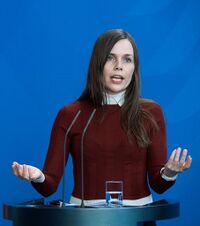Politics of Dau Sel
This article is incomplete because it is pending further input from participants, or it is a work-in-progress by one author. Please comment on this article's talk page to share your input, comments and questions. Note: To contribute to this article, you may need to seek help from the author(s) of this page. |
The government of the Socialist Republic of Dau Sel is divided into three branches; the executive, the legislative, and the judicial. The executive branch is headed by the Cænír (Prime Minister) who is the head of the majority party. The legislative branch is broken into the Teach Cúige (Provincial House) and the Teach na Ionadaithe (House of Representatives). The judicial branch is headed by the Hoffcuírt (Supreme Court).
The executive branch is headed by the Prime Minister who is the party leader of the ruling party in the House of Representatives. The current Prime Minister of Dau Sel is Effie Muirenn of the Socialist Democracy Party. The Prime Minister is primarily tasked with assembling a cabinet to exercise the law and acting as commander in chief. The Prime Minister is allowed to serve so long as they are the head of their party and their party maintains their position within the House of Representatives. The Prime Minister can be removed via a vote of no confidence within the House of Representatives.
The legislative branch of Dau Sel is comprised of the Provincial House and the House of Representatives. The House of Representatives is comprised of 439 elected representatives in a proportional representation system where seats are allotted to the various parties based on what percentage of the total vote they received. The Provincial House is comprised of 447 elected representatives, each representing their province. All elections are done with a system of approval score voting where each of the parties or candidates are given a score between 0 and 5 by the voters and the parties or candidates that receive the highest amount of favorability are elected. The Provincial House is not allowed to initiate a vote of no confidence, but they are allowed to propose laws. A vote of no confidence can only be proposed by the House of Representatives. The Provincial House's main power is to vote on bills that have passed the House of Representatives, however, if a bill is voted down in the Provincial House the House of Representatives can overrule this decision with a 2/3 majority vote.
| Party | Abbreviation | Leader | Ideology | Seats in the Teach na Ionadaithe |
|---|---|---|---|---|
| Government | 224 | |||
| Socialist Democracy Party Páirtí Daonlathais Sóisialaí |
PDS | Effie Muirenn | decentralization, pro-west | 162 |
| Liberal Party Páirtí Liobrálach |
LIOB | Armas Eva | decentralization, social liberalism | 23 |
| International Workers Party Páirtí Idirnáisiúnta na nOibrithe |
PIO | Hildegard Åse | internationalism, syndicalism | 20 |
| Dau Selan Naturalist Party Páirtí Nádúraí |
NÁD | Benjamín Somerled | environmentalism, internationalism | 19 |
| Opposition | 215 | |||
| Revolutionary Socialist Party Páirtí Sóisialach Réabhlóideach |
PSR | Gilroy Thore | centralization, anti-west | 146 |
| Traditionalist Party Páirtí Traidisiúnta |
TRAID | Niilo Aki | social conservatism | 39 |
| United People's Party Páirtí an Phobail Aontaithe |
PPA | Seán Tero | foreign aid, interventionism | 19 |
| Families of Dau Sel Teaghlaigh Dæsala |
TEAG | Torild Sari | social conservatism, ruralism | 6 |
| Our Homeland Fár Dúchai |
FD | Aislinn Muirenn | social conservatism, nationalism, right wing populism | 5 |
| Total | 439 |
The judicial branch is headed by the Hoffcuírt (Supreme Court). The Supreme Court is comprised of 9 judges. These judges are appointed by the Prime Minister and serve a life term unless they step down or are removed by the Representative House. The primary function of the Supreme Court is to interpret the law and the Constitution of the Socialist Republic of Dau Sel.
